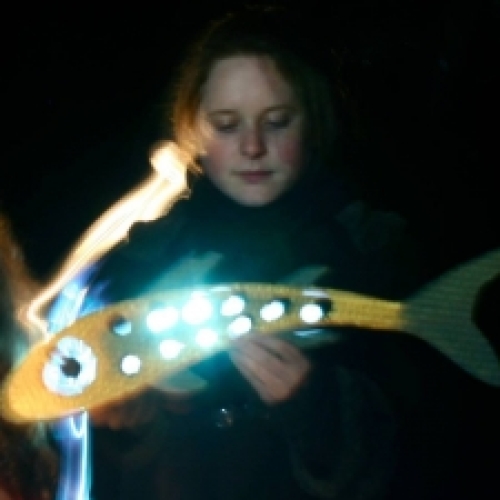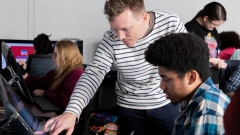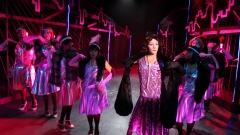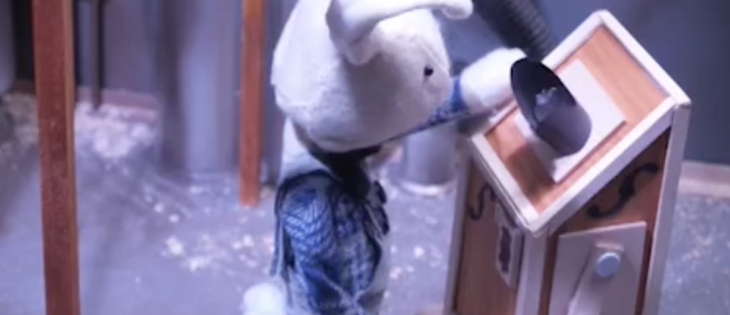Rachel Gitlevich

BFA '10
CHOOSING A SCHOOL TO STUDY ANIMATION AND FILM:
Q: First of all, why study animation AND film? Did you consider illustration, comics, graphic design, or film/video?
I went into film/animation mostly because I honestly just couldn’t choose. Animation encompassed such a broad skill set…I felt that by being in film/animation I could get the most out of what the art school could offer. You had to paint backgrounds, build props, learn how to light. All of it was dead useful to me. OH and money. Animation had an industry so I figured I’d like to get paid for my work sooner out of college than later, hahaha.
Q: What were you thinking about when looking at animation schools? Where did you look? What made you select UArts?
So, there wasn’t a lot of information out about art schools in general when I was in HS. What I learned I learned from portfolio day. The only animation programs I knew of were Calarts, SCAD, RISD, Ringling, and UArts. So…I just wanted a school that could teach me how to animate but also have enough extra-curriculars to keep my curiosity satisfied. I still wanted to sculpt, do puppetry, stop motion, paint, and get better at illustration.
I ended up only applying to Calarts and UArts. UArts had the advantage of having a generalized freshman year…whereas Calarts [at that point in time] had you choose not only your major but your FOCUS off the bat without ANY previous knowledge. UArts was also comfortable for me because I had been taking lots of pre-college classes with them, and could save money by staying at home. Those scholarships were also super helpful. It was the ideal option for me.
Q: Did UArts seem like an animation school that would prepare you to a) write/direct your own independent films as an author of original work, b) learn the fundamentals of animation and the history of the form, and/or c) gain viable production skills to get an entry level job in a commercial studio soon after graduation?
UArts felt like the kind of place that would give me the tools to go out and do whatever I wanted. It didn’t force any kinds of expectations on me? It was one of those schools that came off as “you’ll re-discover what you want as you go along. For starters, just learn how to do your craft before you can think about being a professional in it.”
Q: What was the first animation that you made (before or at UArts)? Were you happy with it?
The first animation I ever made was in 8th grade - it was a short silent cut out film about a fox and a crane. I had no idea how recording animation worked…so I just turned the camcorder on and off and fast as possible. Also for some reason I had no concept of editing..so I did the entire film in camera. I’m unreasonably proud of it. It was an ambitious project but I had a focused obsession with it.
EXPERIENCES DURING SCHOOL:
Q: Can you describe what you valued during your time at UArts that prepared you for the animation work you’ve done since graduating?
Gosh can I be a complete cheeseball and say everything? I loved my teachers, loved my classes, loved my classmates. I loved all the delicious extra curriculars I could take, and honestly bemoan not having the time to take more. There was a healthy level of friendly competition, but also just so much heart and good spirit. I’ll never forget one of my liberal arts professors getting me a cup of tea during a break after seeing me struggling to stay awake during her class. Like, that’s the kind of environment I had the privilege to learn in. Everyone was always helping each other out on projects. I got to meet and work with Dan Magro who will forever be one of the most influential people in my life. I met life long art partners and just some of the best people of my life here. Is this enough? I can keep gushing for a few paragraphs more but you guys get the idea. Like, I didn’t sleep because was trying to take advantage of every waking moment.
Q: Can you describe what you would have liked to see added to your UArts animation education or what you could have used less of?
It would have been nice to have more contact with industry professionals, I think. Like we had these big to do’s with animators coming in, but they always felt too important for little ol' me to talk to. Speaking from 20/20 hindsight here…but I think it would have been really cool to get to interact with the people we aspired to be, if that makes sense? I remember Sean McBride coming in to talk to us about taxes once. That was super helpful. It was like “WHAT’S IT LIKE IN THE FRONT LINES!?” He was really cool!
A commuter lounge would have been nice, too. It was kinda funny how quickly the couches deteriorated because animators kept fighting over who could sleep on them. We work lots of long hours so it would have been nice to have a place to nap.
Q: Can you talk about the community of peers and/or instructors that you encountered at UArts if they were notable in any way?
I think I covered it during my explosion of heart bubbles a few questions up. But seriously, the community is what made it. I could walk into any one of my teacher’s offices at any time and talk about anything. Show them shots in progress, get some feedback on it. I could crash any class I wanted - I made a lot of teacher friends that way. Never actually had classes with them, but they were always happy to look at my work and teach me things.
The kind of peer network that is organically created really helped with getting jobs and helping people get jobs. I keep saying this over and over - but animation is a team sport. And even though everyone is mostly doing their own art at UArts…we still worked as a team. Ate together, learned together, trained together. UArts folks look out for one another. I’ve never encountered that kind of mindset in any other group of people I’ve been with.
AFTER GRADUATION:
Q: How did you get your start in the industry?
I got my foot in the door thanks to an alum who I met during a tour of NY animation studios. She helped me get an internship…which led to a job 3 years later. There was a tiny tight-knit community of alumni who all kind of held together and kept each other abreast of information and opportunities, and I think that teamwork helped us all find work and break into the industry.
Q: What has been your career path up until this point? Who did you talk to, were you recruited, did you apply, what were your routes to those past jobs?
It started with internships (in school and right after school) intermixed with those super low pay “for exposure” gigs (music videos, short films, etc…). I was working part time and teaching art to kids for money, the rest were to stay in the game and build up a body of work. As cheesy as it sounds I kept a blog called “one a day” to hold myself to continue to make art.
I loosely kept in touch with people from my internships on Facebook - and sooner or later one of them posted about a job opportunity. I believe it was on a Wednesday. I called in sick from work and snuck up to NYC to interview on Thursday, and was asked to start the following Monday. I quit my life and moved to NY in a weekend. I was fortunate to have friends let me couch surf for a bit till I could settle down somewhere more permanent (NJ, aaayyyyyyyy). It just so happened that a good friend of mine had started at Titmouse around the same time I started at Flickerlab. He told me they needed more animators for a show they were working on, and passed along an animation test. I don’t know *how* - but with his recommendation and my test I passed! And got into Titmouse. The rest is history and 4 years later I’m still there :)
WHAT YOU’RE WORKING ON NOW:
Q: Can you describe your job now, your day-today responsibilities?
I currently work as a 2D character animator. Essentially I am assigned scenes to do (whether its a show, a pilot, or a commercial etc…), and by following the director’s instructions and the storyboards, I will lay out the shot and then animate it. Depending on the show I’m working on, sometimes I have to do my own cleanup, sometimes it gets shipped oversees to get cleaned up or inbetweened. Sometimes I already have layouts provided and all I have to do is animate.
Q: What have you learned on the job that could only be gained from first-hand practical studio experience?
I guess over time you build a tool belt of animation techniques you can fall back on. The thing with TV animation is you gotta be making quota and picking your battles. Not every shot can be as beautifully animated as you know you can make it to be…just because of time and energy (and lemme tell you about burnouts! hahah). So a lot of times it’s just figuring out the most efficient way to get from one pose to the next. You build up a stamina.
Unlike school, where every assignment is kind of your chance to shine, doing this as a job really grates you down. You can be on a shot for 40 hours in your week…and you don’t have the breakup to your day that you get at school or juggling smaller freelance gigs. Experience is really your best teacher. School does a phenomenal job at exposing you to all these things you normally wouldn’t even think to look for. Working really puts it all into practice, and the more you practice the better you get!
Q: What is your advice then, to the current students and prospective students at UArts, if they would like to pursue a career in animation?
TAKE ADVANTAGE OF YOUR PROFESSORS. Be aggressive. If you gotta bully the registrar to get the classes you want BULLY THEM because it’s your money and your time. Animation is such a sprawling field and there is so much wonderful stuff you can do inside of it. You really wanna take a class but it doesn’t fit in your schedule? Just crash it. Who cares about the paperwork? Talk to your professors. KEEP DOING WORK. Don’t expect everyone to hand you information on a silver plate. UArts is a rich mine of hidden knowledge, all you have to do is lift your finger and dig for it yourself. Get the most out of your buck. You’re not paying to twiddle your thumbs and whine and complain about how hard it is or how stressed out you are. If you can’t keep up now, you’ll never keep up.
Also for the love of god REACH OUT TO INDUSTRY PROFESSIONALS. Get unbiased reviews of your work. Put yourself out there. You lucky sods have social media now, TAKE ADVANTAGE OF IT. Make friends. Remember, animation is a team sport. Its not about you and your vision, its also about how well you get along with people.
GO TO OTTAWA. GO TO ANNECY. STUDY FOR A SEMESTER IN KOREA OR JAPAN. Take advantage of your student status. Its the only time in your life you get to widen your eyes twirl your hair and play the poor curious student card and get stuff for free/at a discount. Because the second you start a full time or even a part time job your ability to spend money on classes and keep learning will deteriorate very very quickly. I mean seriously…one of your professors DRIVES YOU UP TO A DIFFERENT COUNTRY TO SEE AMAZING INTERNATIONAL ANIMATIONS. [Ed note: Rachel is referring to annual Animation department trip with students to attend the Ottawa International Animation Festival each fall in Canada. Further note, Rachel won for Best Pumpkin Carving one of the multiple years she has attended as student and then alum.]
FAIL. MAKE MISTAKES. STOP COMPLAINING ABOUT YOUR LIBERAL ARTS COURSES. Being a good technical artist is useless if you can’t be intelligent about it. If you don’t know the history and context of your art you’re gonna be exposed for a fool later on.
You're not here to have fun, you're here to work. If you don't enjoy the work, then you'll never keep up with it. But it’s animation...you get to make cartoons. So how can you not have fun!?






